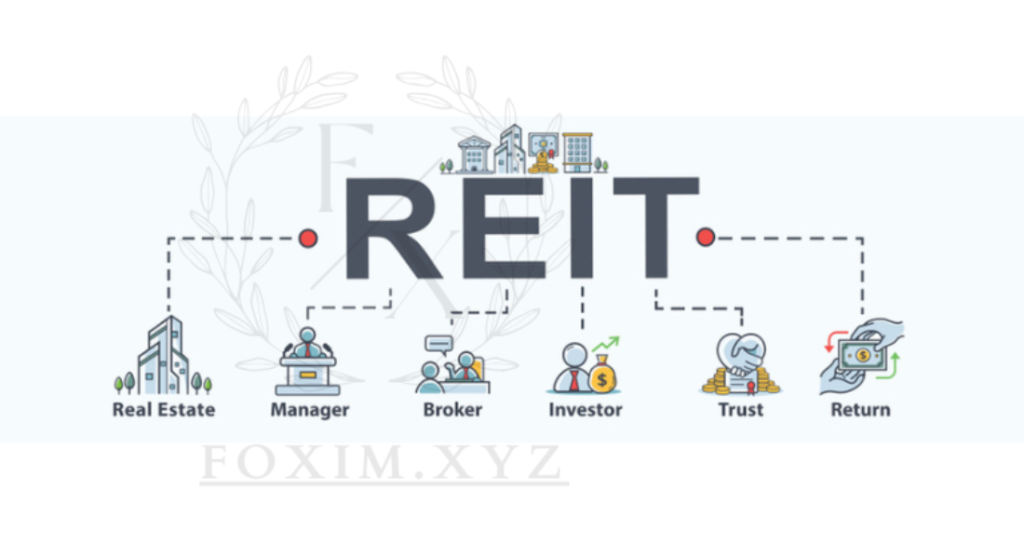What is a Real Estate Investment Trust (REIT)?
Real estate has long been considered a solid investment, known for providing consistent returns and acting as a hedge against inflation. However, investing directly in real estate can be capital-intensive, complex, and require significant management. This is where Real Estate Investment Trusts (REITs) come into play.
REITs have democratized real estate investment by allowing individual investors to pool their money into a fund that holds income-generating properties. By investing in REITs, you can gain exposure to the real estate market without the need to buy or manage property directly. In this article, we will explore the mechanics of Real Estate Investment Trusts, the benefits of investing in them, the different types of REITs, and tips for choosing the best REIT for your investment portfolio.
What Are Real Estate Investment Trusts (REITs)?
A Real Estate Investment Trust (REIT) is a company that owns, operates, or finances income-producing real estate. These trusts pool capital from multiple investors to acquire and manage a portfolio of properties, which may include commercial, residential, industrial, or healthcare-related real estate. By law, REITs must distribute at least 90% of their taxable income to shareholders in the form of dividends, making them an attractive option for those seeking regular income from their investments.
REITs can be publicly traded on stock exchanges, privately held, or listed on over-the-counter markets. Publicly traded REITs are the most common type and offer investors the ability to buy and sell shares just like any other stock, providing liquidity and flexibility.
The Benefits of Investing in Real Estate Investment Trusts
There are several reasons why investors consider Real Estate Investment Trusts as a compelling addition to their portfolios. Below are the key benefits:
1. Diversification
One of the most significant advantages of REITs is the ability to diversify your portfolio. Real estate is a different asset class from traditional stocks and bonds, and it often behaves differently under various economic conditions. Adding a REIT to your investment mix can help mitigate risks and provide a buffer during market volatility.
REITs also allow you to diversify geographically and across different sectors of real estate. For instance, a single REIT can give you exposure to residential, commercial, retail, and industrial properties all over the world, reducing the concentration risk associated with investing in just one type of real estate or one market.
2. Steady Income Stream
REITs are known for their attractive dividend yields. Since REITs are required to distribute at least 90% of their taxable income as dividends, they provide a steady income stream for investors. This is particularly appealing to income-seeking investors, such as retirees, who rely on regular payouts from their investments.
The dividends from REITs are often paid quarterly, and some REITs provide relatively high dividend yields compared to traditional stocks or bonds.
3. Liquidity
Unlike physical real estate, which can take months or even years to buy and sell, REITs offer liquidity. Publicly traded REITs are listed on stock exchanges, meaning you can buy and sell shares easily, just like stocks. This makes it much more convenient for investors to access their capital and react quickly to changing market conditions.
The liquidity of REITs gives investors the flexibility to move in and out of investments without being tied to the long-term commitment and illiquidity of direct real estate ownership.
4. No Property Management Hassles
Investing in real estate directly often comes with the burden of property management, including maintenance, tenant relations, and legal complexities. By investing in a Real Estate Investment Trust, you can enjoy the benefits of real estate exposure without the stress of property management. REITs are managed by professional teams that handle the day-to-day operations of the properties, saving investors time and effort.
5. Access to Large-Scale Properties
For individual investors, buying large-scale commercial real estate such as office buildings, shopping malls, or industrial parks is typically out of reach due to the significant capital required. REITs pool the capital of many investors, enabling them to invest in high-value properties that would otherwise be inaccessible. This provides individual investors the opportunity to own a stake in premium real estate that they would not be able to afford on their own.
6. Tax Benefits
In many countries, Real Estate Investment Trusts enjoy special tax treatment. As long as the REIT meets certain regulatory requirements—such as distributing 90% of its income—its income is generally not taxed at the corporate level. This tax efficiency means that REITs pass on more of their earnings to shareholders, increasing the potential for higher returns.
Types of Real Estate Investment Trusts
There are several types of Real Estate Investment Trusts, each with its own unique characteristics and investment focus. Here are the main categories:
1. Equity REITs
Equity REITs are the most common type of REIT. These trusts own and manage income-producing real estate, such as apartment buildings, office spaces, shopping malls, hotels, and industrial properties. The primary source of income for equity REITs comes from the rent paid by tenants. These REITs typically focus on long-term capital appreciation and provide regular dividend payouts.
2. Mortgage REITs (mREITs)
Mortgage REITs invest in real estate loans rather than physical properties. They provide financing to real estate owners and operators by purchasing or originating mortgages or mortgage-backed securities. Mortgage REITs generate income primarily through the interest earned on the loans they hold, and they may also invest in government-sponsored entities like Fannie Mae or Freddie Mac. These REITs tend to be more sensitive to interest rates, and while they offer higher dividend yields, they may come with more risk.
3. Hybrid REITs
Hybrid REITs combine elements of both equity REITs and mortgage REITs. These trusts may own and manage properties like equity REITs while also holding real estate loans or mortgage-backed securities. By diversifying their investments in both real estate assets and debt instruments, hybrid REITs offer a balanced approach, potentially providing higher yields with moderate risk.
4. Public vs. Private REITs
- Publicly Traded REITs: These REITs are listed on stock exchanges and can be bought and sold like any other stock. They provide liquidity and are suitable for investors who want an easy way to invest in real estate without being tied to a long-term commitment.
- Private REITs: Unlike publicly traded REITs, private REITs are not listed on stock exchanges and are typically available only to accredited investors. While private REITs may offer higher potential returns, they come with higher risk and limited liquidity.

5. Sector-Specific REITs
Some REITs focus on specific sectors of the real estate market, such as:
- Healthcare REITs: Focus on properties like hospitals, nursing homes, and medical offices.
- Retail REITs: Invest in shopping centers, malls, and retail properties.
- Industrial REITs: Focus on warehouses, distribution centers, and logistics facilities.
- Residential REITs: Own and manage residential properties, including apartment buildings and single-family homes.
Each type of REIT offers a different risk and return profile, depending on the sector it focuses on and the geographic regions in which it operates.
How to Invest in Real Estate Investment Trusts
Investing in Real Estate Investment Trusts is relatively simple. Here’s how you can get started:
1. Buy Shares of Publicly Traded REITs
The most common way to invest in REITs is by purchasing shares of publicly traded REITs through a brokerage account. You can invest in individual REITs or opt for a REIT exchange-traded fund (ETF) or mutual fund, which holds a diversified portfolio of REITs.
2. Consider Private REITs
If you are an accredited investor, you may also consider investing in private REITs. These REITs are often available through real estate crowdfunding platforms or private equity firms. However, private REITs come with higher risks and less liquidity than publicly traded ones.
3. Evaluate the REIT’s Dividend Yield and Performance
Before investing in a REIT, it’s essential to evaluate its dividend yield, historical performance, and the types of properties it owns. Look at factors such as occupancy rates, the quality of the properties in its portfolio, and the experience of its management team.
Conclusion: Is a Real Estate Investment Trust Right for You?
Real Estate Investment Trusts (REITs) offer a unique opportunity for investors looking to gain exposure to the real estate market without the complexities of direct property ownership. With their ability to generate passive income, provide diversification, and offer liquidity, REITs can be a valuable addition to any investment portfolio.
Whether you’re interested in equity REITs, mortgage REITs, or sector-specific REITs, understanding the various types of REITs and their benefits can help you make informed investment decisions. By carefully evaluating a REIT’s performance, dividend yield, and underlying assets, you can choose the right REIT to suit your investment goals.
With their potential for steady income and long-term growth, Real Estate Investment Trusts offer a compelling and accessible way to invest in real estate. Consider adding REITs to your portfolio today and start enjoying the benefits of real estate investing.
